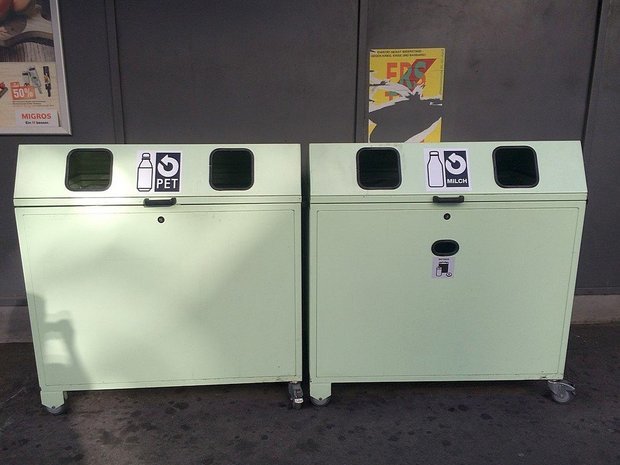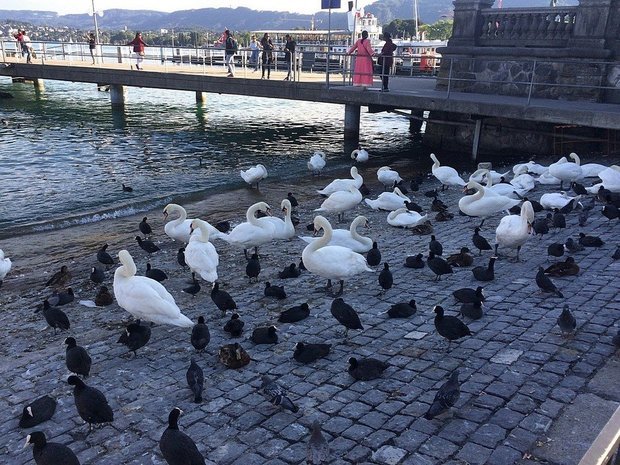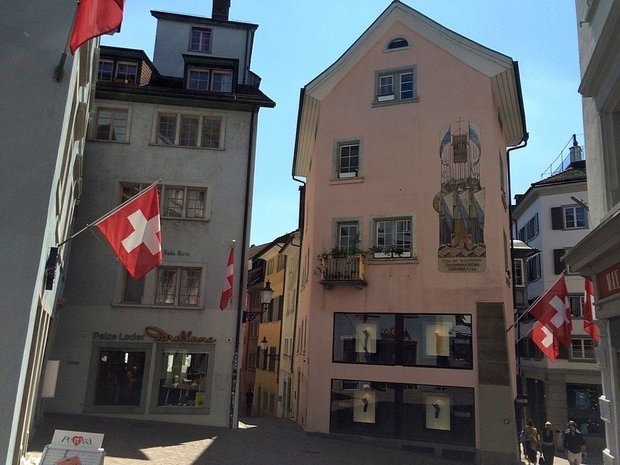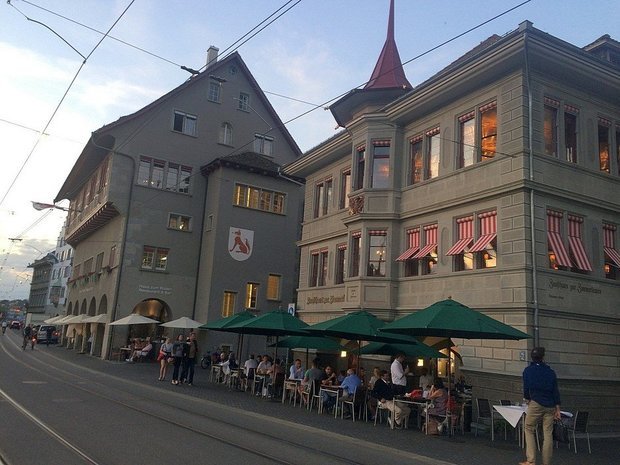Tourist Zurich: array of swans, shawarma for $10 and 'Fight Erdogan!'
Travel notes of Realnoe Vremya correspondent who went to Switzerland to study the waste issue
Zurich is almost unaffordable city for the average Russian with a high standard of living and comparable high level of prices. The correspondent of Realnoe Vremya, who went there by the invitation of AGC-2 to study the waste issue, assessed all variety of peoples living in the Swiss city, marvelled at the array of swans begging from people for food, and absence of homeless people. Read the details of the trip in our material.
Wealthy and prosperous
Zurich is considered one of the most expensive cities in the world, and walking along the streets of the city one agrees with this — this is exactly true. At the sight of prices in shops and cafes, Russian guests with an average salary of 35,000-45,000 rubles round the eyes to the size of a saucer. And it is clear why — as our interpreter from German told, the average salary there makes about 4,000 Swiss francs, therefore for them it is comparable with local price tags. And this is only the average — for highly paid professions it is 10,000-12,000 francs. What can I say — on the streets in addition to numerous bicycles and mopeds there are luxury Mercedes, BMWs and Jaguars — of course, many of them are convertibles. The data on the number of billionaires varies greatly, but it is known that Switzerland is among the first countries where very wealthy foreigners like to go to live.
They say there are practically no homeless people — they simply do not survive in such conditions. Moreover, the homeless are deprived of the opportunity even to dig in the bins because people do not leave biological waste at home — at least we did not see it, though because of the main theme of our trip, I must admit, we were interested in the contents of garbage bins.

Not even restaurants, but even McDonald's or a street stall where they sell fast food are expensive with the current currency rates. If in restaurants two cheeseburgers and 0,4 liters of tea cost about 9 francs, then shawarma so beloved by Russians cost 10 francs. In shops, the prices are different — in the centre they are higher than in the suburbs.
Without stray animals and with dozens of swans
To be honest, the architecture of the city did not delight us — the centre of the city, of course, can please with similar to Italian streets and buildings with its history, but most of the city is the areas are in the style of German constructivism, generously diluted with green corners. Judging by the number of construction cranes, the city continues to be actively developed.
What impressed us was Zurich Lake, around which there is a promenade with flower beds, favoured by young people of all races and nationalities. The main asset of this place is, of course, swans. There are more than 50 adult birds, and around them there are not less than one hundred small, still black little swans. It is impossible to touch them with hands — the height of the promenade does not allow, but to feed — easily. The inhabitants of the lake, accustomed to the people, swim up to them themselves in anticipation of a nice bonus in the form of food.

It is impossible to meet stray animals on the streets. If several cats can sit in the sun on the porch of a house (most likely where they live), then dogs walk exclusively on leashes. The law began to protect Swiss animals in the middle of the last century. Throwing out a pet on the street is punishable by fine, but the maintenance of a large number of animals at home without proper care is also contrary to the law. Veterinary services in the cantons are responsible for its compliance. A veterinarian, for example, can visit the owner of the dog and confiscate it in case of abuse. Homeless animals are taken to shelters that exist without state support. It is not accepted to kill a pet, even if it can not find a house for a long time — the animal will be taken care of until the last.
Illicit 'Fight Erdogan!' and the migration issue
Zurich is called one of the best cities in the world by quality of life and one of the safest one. We would not argue with the first statement, but the second can be questioned. Migrants from different countries aspire to the Swiss city. All this leads to a great diversity of peoples, cultures and religions. The usual picture is this: two chubby boys with paces pass by you on a bike and scooter, a woman in a sari is going across the street, and nearby there sits a black guy without a shirt with a speaker in the hands, which produce very loud energy music.
By the way, we lived, apparently, in the area where the Indian diaspora lived — it was clear by a supermarket, where on cash desk the visitors were met with a banana with the aroma stick stuck in it and abundance of the Indian goods, and a large number of the Indians strolling on the area or the companies waiting out heat in a shade.

Our short trip coincided with the waiting for the World Cup final, and in Zurich in this regard, throughout the city there were numerous Croatian flags on the balconies and not a single French one. The reason is that at one time many Croats moved to Switzerland to work and quite successfully began to assimilate. What cannot be said about Albanians, whom the locals are afraid of. They moved here as refugees and quickly began to dictate their rules. For example, our translator told us one horrible story — in a café an Albanian stabbed in the throat with a knife his friend just because of the fact that it seemed like he gave the cold shoulder to him. Fortunately, the victim managed to be saved. Tamils — the people mainly living in Sri Lanka — also moved to Zurich as refugees. The locals are also afraid of them, but they do not give such anxiety as the Albanians do.
Tibetans and Kurds also migrate there. The latter open their shops and cafes under Turkish flags. At the same time, they do not support Turkish nationalism. For example, the correspondent of Realnoe Vremya witnessed how three kilometres from the centre a guy wrote 'Fight Erdogan!' on the wall while a girl next to him and a guy across the street watched for safety.
There are few Russians in Zurich, unlike, for example, in Rome, Barcelona or Prague, as well as among tourists. They say that Russians families mostly do not move to the Swiss city, so if you meet a Russian, then it is usually women who married a Swiss.

Legal marijuana
Another interesting feature of Switzerland as a whole is the legalization of light drugs. In particular, in Zurich in the store you can buy marijuana, with a content of THC not more than 1%. One legal joint there cost like one shawarma — 10 francs. Anything over 1% is illegal. The exception is the use of the substance for medical purposes — marijuana can be purchased by prescription legally in special pharmacies.
CEO of the waste incinerator Renergie Ruedi Kummer says that the police to the idle use of cannabis is negative and the beveled plant is usually sent to burn in their furnace. However, in Zurich itself they still very fond of this substance — walking around the city, here and there you hear the specific smells — young people smoke joints openly, without fear of any sanctions. This is especially noticeable in the area with clubs and bars — passing by them, you are literally immersed in the smoke screen of marijuana. It causes big doubts that rolled-up cigarettes are less than 1% THC. However, it does not lead to violation of public order.